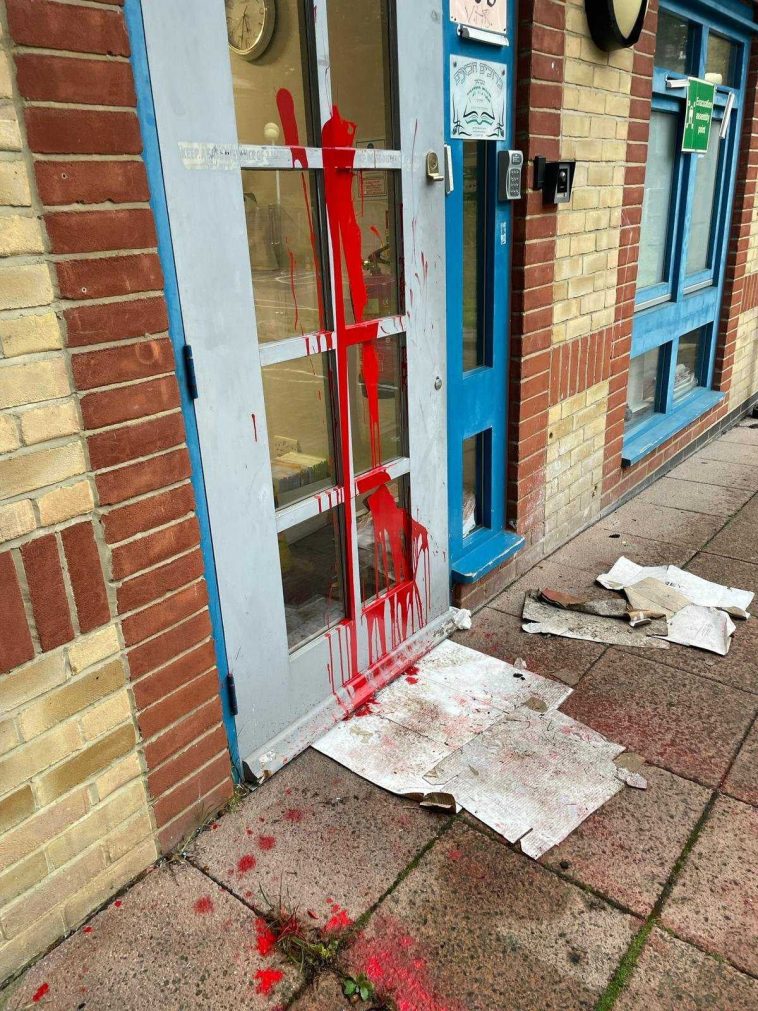In a noteworthy incident this summer, a woman found herself under arrest and facing hate crime charges after red paint was discovered smeared on the residence of the Jewish executive of Brooklyn Museum. The accused, 28-year-old Taylor Pelton, was formally charged with criminal mischief classified as a hate crime on Wednesday. The charge stems from an unfortunate event that took place in June, as confirmed by the New York City Police Department.
The incident involved the residence of Anne Pasternak, the director of the Brooklyn Museum, being defaced with red paint. The unwanted decoration was primarily focused on the front exterior and the main entrance of Pasternak’s Brooklyn dwelling. It was a shocking sight that conveyed a clear message of hostility towards the museum’s director.
Security footage uncovered the identity of the perpetrators and their course of action. The video showed five individuals, donned in fully black attire and wearing masks, operating in the director’s courtyard. The group was seen hanging a banner displaying Pasternak’s name, signaling a directed act of intimidation.
Court papers lodged against the culprits revealed Pelton and five unknown associates departing the criminal scene in a Red Honda Fit. They were captured on camera holding several black bags following their activity around 2 a.m. on June 12. Observations of their actions indicated their organized attack on the director’s property.
Adding to the narrative, video evidence displayed their intent to leave a mark on other properties as well. The individuals were involved in defacing the residences of both Anne Pasternak and Kimberly Panicek Trueblood. Trueblood holds the prominent positions of president and chief operating officer of the institution.
Concerning Pasternak’s house, one officer’s observation disclosed the scatter of red paint and unique red symbols. Details such as the front exterior and courtyard being coated in red paint, inverted red triangles, and red handprints emerged. A mysterious banner hung, accusing Anne Pasternak of supporting white supremacy and funding genocide.
In the aftermath of the incident, New York City Comptroller Brad Lander released photos featuring the vandalized doors and strong language. The images gave a stark depiction of the hostility the museum authorities were facing. Senior law enforcement officials were at the time reported to be hunting for approximately 15 subjects in connection to the case.
This was, in part, due to the appearance of similar instances of property damage in the city. Multiple scenarios of residences being subjected to red paint attacks or spray painting were discovered. The additional properties affected belonged to board members of the esteemed Brooklyn facility, further hinting at a targeted approach.
Pelton, one of the identified suspects, made her first appearance in Kings County Court on the following Wednesday. She presented her plea, declaring herself not guilty to the charges presented before her. As a result of the hearing, Pelton was released under non-monetary conditions and was asked to return to the court on October 30.
The Brooklyn Museum issued an official response to NBC News on a subsequent Friday addressing the situation. They confirmed cognizance of active charges against an individual involved in the vandalism directed at multiple museum executive homes on June 12. The museum reiterated the commitment of the impacted parties to support the ongoing legal proceedings.
Furthermore, the museum officials extended the belief that peaceful protest and criminal acts should be clearly separated. Emphasizing a long-standing tradition of advocating artist’s freedom of expression, they stressed on the significance of constructive dialogue. They persisted in affirming a conviction that dialogue facilitates mutual understanding amongst individuals with varying perspectives.
The incident gains further context considering the recent surge in global protests and demonstrations following the renewal of conflict between Hamas and Israel. The United States, including its many college campuses, have not been exceptions to these escalating tensions. Notably, a rise in unpleasant and hateful episodes directed towards Semitic and Islamic communities has also taken form domestically.
Originally reported by NBCNews.com, the incident underscores a troublesome period marked by unrest and prejudice. Hate crimes, misplaced aggression, and vandalism pose serious threats to cultural institutions, often serving as the backdrop for societal tensions. As the court case unfolds, it could potentially set new precedents in dealing with such offences.


